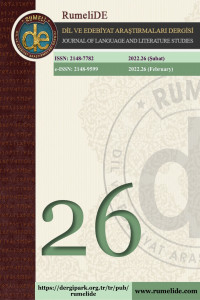Öz
Düşünce tarihinin en başından beri iki figür öne çıkar. Bu figürlerden biri şair diğeri ise filozoftur. Şairi ve filozofu birbirine yakınlaştıran önemli bir nokta ise ideal tutkularıdır. Şair ideal sözü ararken; filozof ise ideal varlığı arar. Şair ve filozof her zaman çok iyi anlaşamazlar fakat her zaman birbirlerine çok şey borçludurlar. Nizâmî Gencevî, felsefe ile şiirin birbirini tamamlayan şeyler olduğunu düşünür ve şiir ile felsefeyi buluşturmayı bu yolla da ideal varlığın ideal söz ile dile gelmesine aracılık etmeyi amaçlar. 1141-1214 yılları arasında yaşadığı tahmin edilen Nizâmî, epik ve lirik şiirin önemli isimlerinden olup hamse türünün de kurucularından kabul edilmektedir. Nizâmî’yi şair kimliğinin dışında özellikle İskendername ve Mahzen-i Esrar adlı eserlerindeki yaklaşımları ile bir düşünür ve filozof olarak da değerlendirmek mümkündür. Bu yazıda daha çok İskendername ve Mahzen-i Esrar adlı iki eserini merkeze alarak Nizâmî’nin hümanizma temelinde, evrensel bir eşitlik inancına sahip olduğu ileri sürülecek ve bunu nasıl savunduğu gösterilmeye çalışılacaktır.
Anahtar Kelimeler
Kaynakça
- Bilgen, A. (2018). Nizâmî’nin Hamsesindeki Eğitici ve Öğretici Nitelikteki Öğütler. Ankara Üniversitesi Dil ve Tarih-Coğrafya Fakültesi Dergisi, 35 (1).
- Gençosman, M. N. (2014). Mahzen-i Esrar, Nizamî. İstanbul: Ataç Yayınları.
- Kanar, M. (2007). Nizâmî-i Gencevî. Türk Diyanet Vakfı İslam Ansiklopedisi, İSAM, C. 33.
- Morris, J. W. (2015). Kalp Aynası: İbnü’l-Arabi’nin Fütuhatü’l-Mekkiyye’sinde Manevi Aklın Keşfi. (Çev. Mustafa Çakmaklıoğlu). İstanbul: İnsan Yayınları.
- Nahmedov, A. Saygın, T . (2012). Doğu’dan Bir Ütopya Kenti: Genceli Nizâmî’nin İskendername Eserinde İdeal Kent. İdealkent, 3 (5),124-135.
- Nifferi, A. (2017). Mevâkıf. (Çev. Nurullah Koltaş). İstanbul: Büyüyenay Yayınları.
- Özgen, M. K. (2020). Gılgamış Destanında ve Mistisizimde İçsel Yolculuk . KARE, (9).
- Quluzade, Z. (2004). “Kamillik Zirvesi”. İskendername. İkbalname içinde. Bakü: Lider Neşriyat.
- Rzaquluzade, M. (2004). Nizami Gencevi: İskendername, İkbalname. Bakü: Lider Neşriyat.
- Şen, Y. (2019). Nizami Gencevi İskendername, Şerefname ve İkbalname. (Şerefname’yi Farsçadan Tercüme Eden: Abdullah Şaik; İkbalname’yi Farsçadan Tercüme Eden: Mikail Rızaguluzade; İzahların Yazarı: Ekrem Cafer). İstanbul: Zengin Yayıncılık.
- Schimmel, A. (2013). İki Renkli Sırma. (Çev. Can Özelgün). İstanbul: Alfa Yayınları.
- Sevsevil, S. (2012). “Önsöz”, Hüsrev ile Şirin’e önsöz. İstanbul: Kabalcı Yayıncılık.
- Sevsevil, S. (2012). Hüsrev ile Şirin: Nizâmi. İstanbul: Kabalcı Yayıncılık.
- Tokmak, N. (2013). Nizâmî-yi Gencevî: Leylâ ile Mecnun. İstanbul: Say Yayınları.
The ideal of Universal Equality in Nezami's Iskendername (The Book of Alexander) and Makhzan al-asrār (The Treasury of Mysteries)
Öz
Two important figures come into promining during the history of thougth. One is philosopher and the other is poet. Key point which bring them closer to each other is their ideal passions. While the poet is looking for an ideal word, the philosopher seeks the ideal being. The poet and the philosopher don’t always get along very well, but they always owe a lot to each other. Nizâmî Gencevî thinks that philosophy and poetry accomplished each other and aims to bring poetry and philosophy together and in this way to mediate the expression of ideal existence with ideal words. Nizâmî, who is estimated to have lived between 1141-1214, is one of the important figures of epic and lyric poetry and he accepted as one of the founders of the hamse genre. Apart from his identity as a poet, it is possible to accept Nizâmî as a thinker and philosopher, especially with his thoughts in his works titled Iskendername (The Book of Alexander) and Makhzan al-asrār (The Treasury of Mysteries). In this article, we will argue that Nizâmî had a belief in universal equality on the basis of humanism, and we will try to show how he defended it.
Anahtar Kelimeler
Nezâmî Ganjavî İskendername (The Book of Alexander) Poem and Philosophy Equity Hamse
Kaynakça
- Bilgen, A. (2018). Nizâmî’nin Hamsesindeki Eğitici ve Öğretici Nitelikteki Öğütler. Ankara Üniversitesi Dil ve Tarih-Coğrafya Fakültesi Dergisi, 35 (1).
- Gençosman, M. N. (2014). Mahzen-i Esrar, Nizamî. İstanbul: Ataç Yayınları.
- Kanar, M. (2007). Nizâmî-i Gencevî. Türk Diyanet Vakfı İslam Ansiklopedisi, İSAM, C. 33.
- Morris, J. W. (2015). Kalp Aynası: İbnü’l-Arabi’nin Fütuhatü’l-Mekkiyye’sinde Manevi Aklın Keşfi. (Çev. Mustafa Çakmaklıoğlu). İstanbul: İnsan Yayınları.
- Nahmedov, A. Saygın, T . (2012). Doğu’dan Bir Ütopya Kenti: Genceli Nizâmî’nin İskendername Eserinde İdeal Kent. İdealkent, 3 (5),124-135.
- Nifferi, A. (2017). Mevâkıf. (Çev. Nurullah Koltaş). İstanbul: Büyüyenay Yayınları.
- Özgen, M. K. (2020). Gılgamış Destanında ve Mistisizimde İçsel Yolculuk . KARE, (9).
- Quluzade, Z. (2004). “Kamillik Zirvesi”. İskendername. İkbalname içinde. Bakü: Lider Neşriyat.
- Rzaquluzade, M. (2004). Nizami Gencevi: İskendername, İkbalname. Bakü: Lider Neşriyat.
- Şen, Y. (2019). Nizami Gencevi İskendername, Şerefname ve İkbalname. (Şerefname’yi Farsçadan Tercüme Eden: Abdullah Şaik; İkbalname’yi Farsçadan Tercüme Eden: Mikail Rızaguluzade; İzahların Yazarı: Ekrem Cafer). İstanbul: Zengin Yayıncılık.
- Schimmel, A. (2013). İki Renkli Sırma. (Çev. Can Özelgün). İstanbul: Alfa Yayınları.
- Sevsevil, S. (2012). “Önsöz”, Hüsrev ile Şirin’e önsöz. İstanbul: Kabalcı Yayıncılık.
- Sevsevil, S. (2012). Hüsrev ile Şirin: Nizâmi. İstanbul: Kabalcı Yayıncılık.
- Tokmak, N. (2013). Nizâmî-yi Gencevî: Leylâ ile Mecnun. İstanbul: Say Yayınları.
Ayrıntılar
| Birincil Dil | Türkçe |
|---|---|
| Konular | Dilbilim |
| Bölüm | Türk dili, kültürü ve edebiyatı |
| Yazarlar | |
| Yayımlanma Tarihi | 21 Şubat 2022 |
| Yayımlandığı Sayı | Yıl 2022 Sayı: 26 |


